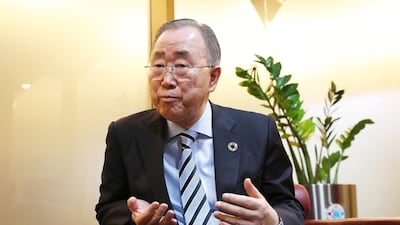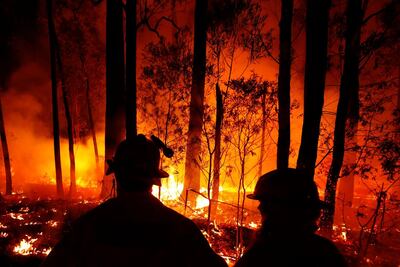Industrialised countries have a moral responsibility to finance solutions that will address climate change, said former United Nations Secretary General Ban Ki-moon.
The South Korean diplomat, 75, was speaking on the sidelines of a model United Nations event in Dubai on Thursday.
“It is unfair, politically wrong, morally wrong when countries that have not contributed much to the climate phenomena should bear the cost and consequences,” said Mr Ban. “If industrialised countries who have contributed seriously negatively to this climate phenomena are not taking their own responsibility than who can?”
Mr Ban was the UN Secretary General from 2007 to 2016 and identified climate change as key issue early in his administration.
“Climate change is most important and serious issue which we have to address most urgently before it is too late,” he said. “People should understand that climate change is now happening much faster, on a much larger scale and it doesn’t care where you’re living.”
The Paris Agreement to limit global warming levels under 2°C was signed by 195 countries during Mr Ban's tenure at the UN.
In 2016, countries pledged to mobilise $100 billion per year by 2020 for long-term climate change mitigation and adaptation. But financing remains scarce.
“We have reached 2020 but because of the lack of political will we have not yet been able to mobilise that which is absolutely, urgently necessary for developing countries to mitigate and adapt,” Mr Ban said.
The Green Climate Fund, established by the UN to mobilise climate funding for developing countries, has “very little”, he said.
“They don’t have much money. It has become almost an empty shell. Of course they have mobilised some tens of billions of dollars but it’s far, far less than the promised amount.”
Wealthy countries will not be immune to suffering, he said, noting the forest fires sweeping Australia and that have hit the US. “We have to mobilise all political will and particularly financial support so that all people around the world can take necessary action.”
The time has come for investment in climate resilient infrastructure, dry land agriculture and coastline protection, he said.
The withdrawal of the US from the Paris Agreement has created “a serious political and psychological impact on the people’s commitment to meet climate targets”.
“I hope that political leaders, particularly of the developed world, should feel much more a sense of moral and political duty," he said.
Businesses, too, must commit.
“At this time, we cannot just expect [everything] from government resources. The business communities should also be ready to provide financial support.”
Unilateralism and protectionism are legacies of the past decade that will shape the twenties, he said.
“At this time, I am deeply concerned about the trend where major, powerful countries, leading countries are not respecting the values and the ideas of the United Nations multilateralism,” he said. “Some countries are speaking now about protectionism, unilaterialsm and they are not providing support for people who are in need.”
Mr Ban is in Dubai as official ambassador for the Gems World Academy Model United Nations. At the event, pupils participate as delegates in a simulation of the international organisation to learn about diplomacy.
He opened the event by speaking of his childhood during the Korean War from 1950 to 1953. Schools were destroyed but the UN provided textbooks, tables and classrooms. “We were very poor and we were very thirsty but we were also very thirsty for good education.”
He reminded pupils to place global issues above personal or national interest. “Just be global citizens,” he said.
“I’m asking you students, equipped with global citizenship, just forget where you’re coming from. You may come from the UK, France of China but this is almost meaningless at this time when we live in the 21st century.”
Passion must be followed by compassion, he told pupils. “Together we can make the world much better.”


